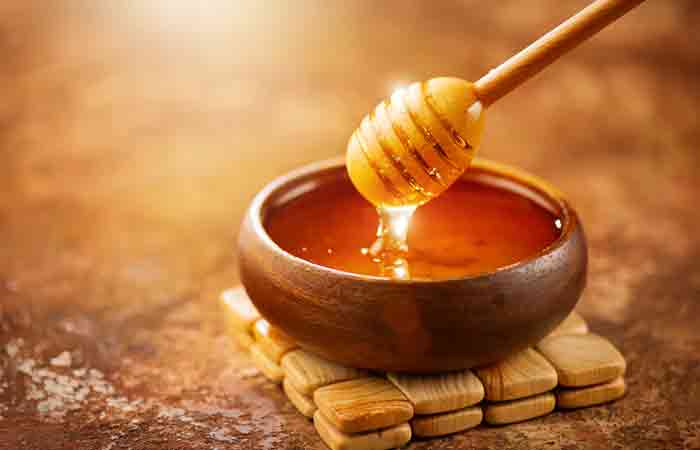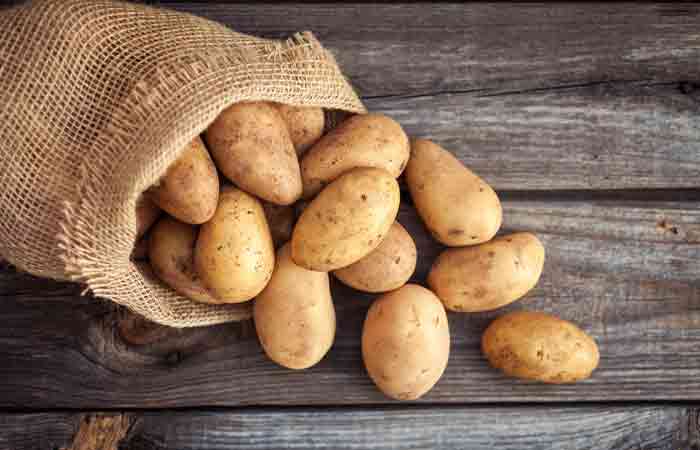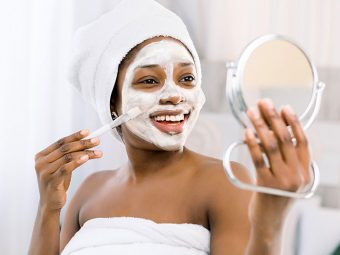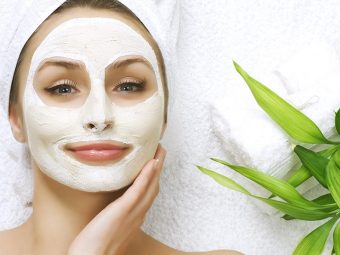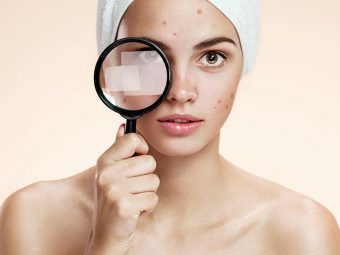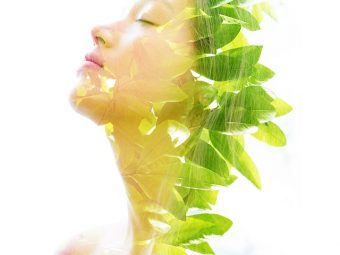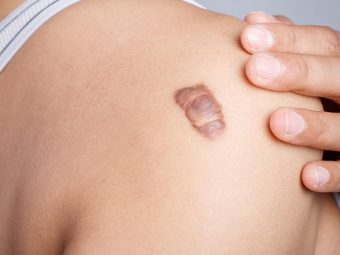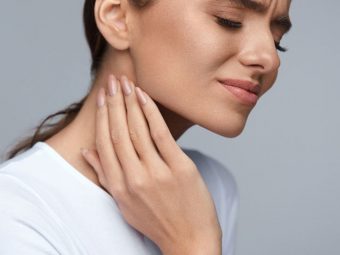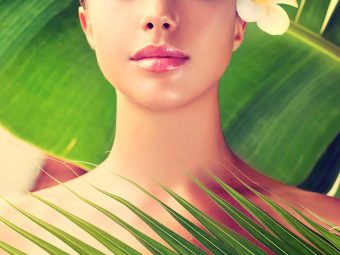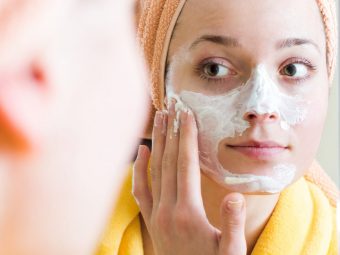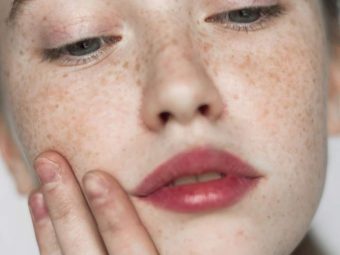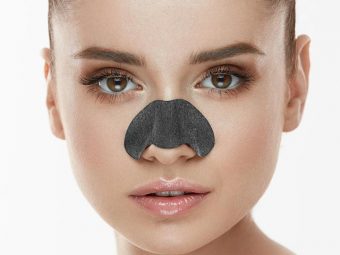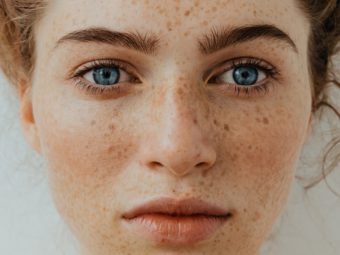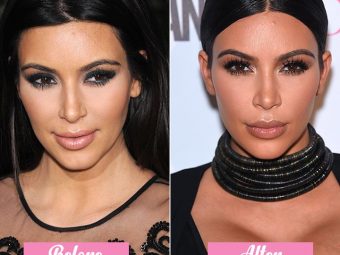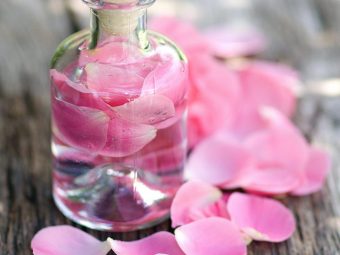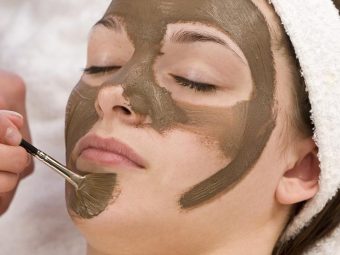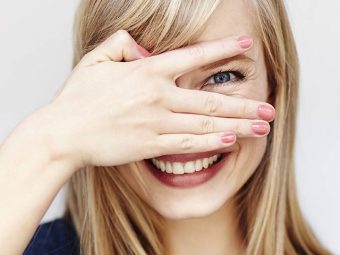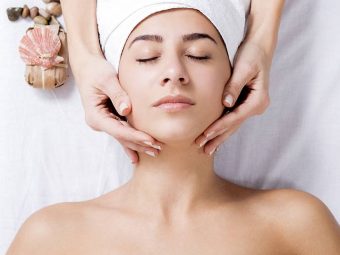10 Best Ayurvedic Remedies To Reduce Acne At Home
Easy DIY recipes and tips to prevent acne and manage breakouts on the face.
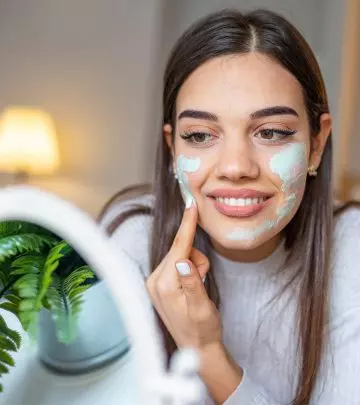
Image: Shutterstock
Ayurveda is an ancient herbal science and alternative medicine that helps treat many ailments. This oldest natural system is effective in skin care as well. There are many Ayurvedic remedies to reduce acne and pimples. These help remove toxins and maintain a hormonal balance that helps reduce pimples, acne, or any other breakouts. This article explores the 10 top Ayurvedic remedies for acne and pimples. Keep reading.
In This Article
10 Best Ayurvedic Treatments For Acne
1. Turmeric
Turmeric has anti-inflammatory, antimicrobial, and antioxidant properties and is used in various home remedies. The active component of turmeric is curcumin which may help treat many skin conditions (1). Applying turmeric to skin may help treat acne, acne scars, hyperpigmentationi XA disorder that darkens the skin. , and dull skin.
Note: If you have lighter skin, turmeric will stain it yellow.
How To Use Turmeric For Acne
There are two ways to use turmeric to treat acne:
- Consume ½ an inch of washed and peeled turmeric root first thing in the morning every day. You should start seeing results in about 3 weeks.
- Use a mortari XA robust, hard bowl used to crush or grind materials with a pestle until they become powdered. and pestle to mash a 1-inch turmeric root. Add 1 teaspoon of gram or rice flour to it. Add a little water and mix well. Apply the mixture to your skin and wait for 15 minutes before washing with water. Do this on alternate days.
A beauty and skincare blogger tried using turmeric to cure her acne. Talking about the results, she shares, “This is not the fastest process to cure pimples I agree but it did not leave any scar/blemish whatsoever. All the ingredients are easily available in your kitchen. And my pimple was gone as if it was never there (i).”
 Fun Fact
Fun Fact2. Neem
Neem leaves have antioxidant and antibacterial properties (2). A study with neem formulation showed a successful effect against Propionibacteriumi XA class of rod-shaped, skin bacteria that grow well in low oxygen environments leading to acne. and Staphylococcusi XA cluster of bacteria that are the source of numerous ailments cellulitis, furuncles, and abscesses (boils). epidermis. Another study confirmed that neem is beneficial for reducing acne during the early or recovery phase (3).
How To Use Neem For Acne
You can use neem in two ways to treat acne:
- Take 10 to 15 neem leaves from the apex (light green or reddish). Wash them thoroughly. Take 500 ml water in a saucepan and toss in the neem leaves. Boil the water until it reduces to half. Store the mix in the refrigerator. Drink it in the morning the next day (add a teaspoon of organic honey to sweeten it). Do this every day.
- Take 10 to 15 neem leaves from the apex. Wash them thoroughly. Use mortar and pestle to make a paste. Mix a teaspoon of neem paste with 2 teaspoons of fuller’s earth and 1 teaspoon of rose water. Apply the mixture to your face and wait for 20 minutes before washing. If you feel itchy, add a teaspoon of rice powder to the mixture and apply. Do this on alternate days.
3. Aloe Vera
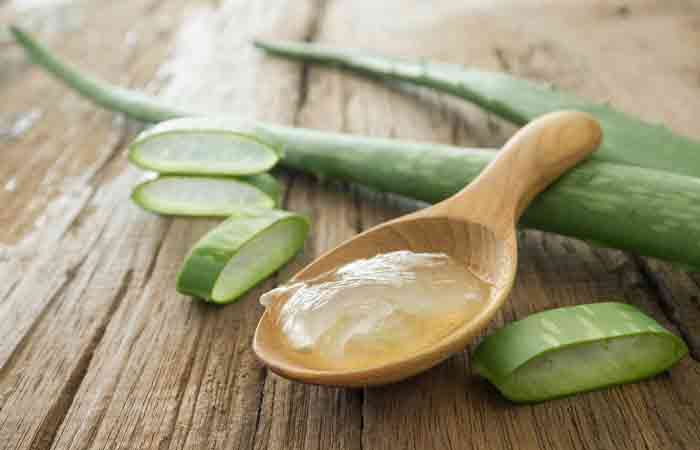
Aloe vera has anti-inflammatory, antimicrobial, and wound-healing properties. It is very effective against acne vulgaris (4). A study showed that consuming aloe vera juice helps reduce non-inflamed acne (5). Another study showed that applying aloe vera and topical retinoids is an effective treatment for mild to moderate acne (6).
How To Use Aloe Vera For Acne
You can either consume aloe vera juice or apply it to your skin:
- Scoop out the gel from an aloe vera leaf. Toss it into the blender. Add 1 cup of water and blend. Pour into a glass, squeeze in some lime juice, and drink it in the morning and evening. Do it every day.
- Scoop out the aloe vera gel and blend it with a spoon. Mix 1 teaspoon of gram flour and 1 teaspoon of aloe vera gel in a bowl. Apply it to your skin and wait for 20 minutes before washing it off. Do this on alternate days.
4. Tulsi or Basil
Ayurvedic herbs like basil are an integral part of traditional medicine. This herb has anti-acne properties and may also improve skin texture. Applying 3% basil cream showed a reduction in skin roughness (7). Another study showed that Thai sweet basil and Holy basil oils are effective against Propionibacterium acnes (8).
How To Use Basil For Acne
You can either consume basil or apply it to your skin:
- Take 2 tulsi leaves, wash them properly, and chew them. Do this every day, first thing in the morning. Drink water to wash them down.
- Add 1 drop of basil oil to 2 teaspoons of fuller’s earth and 1 tablespoon of aloe vera gel. Mix well and apply it to your face. Wash off after 10 minutes. Do this twice a week.
5. Honey
Honey is widely used in ayurvedic and natural remedies for treating various skin and health ailments. It has antibacterial properties and is found to inhibit at least 60 different strains of bacteria (9).
How To Use Honey For Acne
- Take a clean Q-tip. Dip it in organic honey (or manuka honey). Apply it to the affected area as a spot treatment. Wash off after 30 minutes.
6. Sandalwood
Both red and white sandalwood are suitable for pimple treatment. They have antimicrobial, antioxidative, and anti-inflammatory properties. The External application of sandalwood helps heal wounds and reduce inflammation (10). Sandalwood oil can also help treat various skin conditions like acne and psoriasis. However, do a patch test before using sandalwood oil, as many people are prone to developing an allergic reaction to it (11).
How To Use Sandalwood For Acne
- You can purchase red or white sandalwood powder or a small sandalwood and a rubbing stone. Take about 4 teaspoons of sandalwood and apply it to your face. Wash after it dries. Do this every other day to reduce acne and treat acne spots.
 Did You Know?
Did You Know?7. Fenugreek

Fenugreek seeds have anti-inflammatory and antioxidant properties that help soothe and protect the skin (12). They are a natural source of salicylic acid that helps clear clogged pores (13). Studies have also found that consuming fenugreek seeds helps restore hormonal balance and reduces the symptoms of polycystic ovaries. Adult acne is one of the symptoms of PCOS (14), (15).
How To Use Fenugreek For Acne
There are two ways to use fenugreek to treat acne:
- Soak 2 teaspoons of fenugreek seeds overnight in 375 ml of water. Strain the water and drink it first thing in the morning. Do this every day.
- Toss the soaked seeds into a blender, add a little water, and blend into a smooth paste. Add 2 to 3 drops of lime juice and mix well. Apply it to your face. Wash off after 20 minutes. Do this on alternate days.
8. Papaya
Papayas are a good source of antioxidants like lycopenei XA naturally occurring fat-soluble pigment mostly present in tomatoes and other red fruits that is considered to prevent cancer. and beta-carotenei XA substance that lends plants their vibrant yellow, orange, and red colors. (16), (17). Papaya seed extract could be a more potent antioxidant than vitamin C. Reducing toxin buildup while promoting anti-aging benefits can help protect your skin from acne flare-ups and make your skin even-toned and glowing.
How To Use Papaya For Acne
You may use papaya in the following ways to treat acne:
- Consume half a bowl of papaya as a snack. You may also add it to your smoothie. Do this on alternate days.
Note: Papaya also has a laxative effect.
- Mash the papaya and apply it to your skin. Wash off after 20 minutes. You may also soak papaya seeds overnight, blend them in the morning, and apply them to your skin. Wash after 20 minutes. Do this on alternate days.
9. Potato
Potato juice is rich in antioxidants (18). Applying it to the skin helps soothe inflammation and gradually fade away scars (19). If you have dark acne scars, applying potato juice can help even out the skin tone and make your skin brighter.
How To Use Potato For Acne
- Wash and peel a small potato. Grate half of it and press to squeeze out the juice. Apply it immediately to your skin. Wait for 30 minutes before washing. Do this every day.
Note: You can also add turmeric and aloe vera to it. Potato juice can also be applied to dark circles.
10. Triphala
Triphala helps counteract acne from within. This herbal medicine has antimicrobial, anti-inflammatory, and antioxidant properties. It also helps keep your gut healthy and boosts immunity (20). These properties may make Triphala quite effective in treating various health and skin issues, including acne.
How To Use Triphala For Acne
- Mix 1 teaspoon of Triphala powder with 350 ml of water. Steep it overnight. Drink it first thing in the morning. Do this thrice a week.
Note: Triphala has a laxative effect. Consult your doctor before using it, especially if you have IBD/IBS or ulcers.
These are the 10 best ayurvedic treatments for acne. However, these remedies alone may not help if you do not take care of your lifestyle and diet. So, it’s important to know the root causes of acne and work on them.
Causes Of Acne
Several factors contribute to acne formation (21). These are:
1. Hormonal Changes: Fluctuations in hormones, particularly during adolescence, menstrual cycles, pregnancy, or polycystic ovary syndrome (PCOS), can stimulate excess oil production leading to oily skin, which can trap bacteria and cause acne.
2. Bacteria: Propionibacterium acnes, a bacteria that lives on the skin, can multiply in clogged pores, triggering inflammation and acne.
3. Clogged Pores: Dead skin cells and debris can block hair follicles, creating an environment for acne to develop.
4. Genetics: If you have a family history of acne, you might be prone to it.
5. Diet And Lifestyle: Certain foods, such as excessive amounts of refined carbohydrates, fast food, and sugary beverages, stress, and lack of proper skin care can exacerbate acne.
Here are a few more tips that can help you reduce acne. Take a look.
More Tips To Get Rid Of Pimples And Acne
- Drink 3 to 4 liters of water per day.
- Keep your face clean by washing it twice a day with a gentle cleanser.
- Apply a light moisturizer if you have oily skin.
- Stay away from processed and oily foods like pizza, salami, fried chicken, etc.
- Include more veggies and fruits in your diet.
- Consume juice and nuts as snacks.
- Exercise regularly.
- Reduce alcohol consumption.
- Avoid smoking.
- Use non-comedogenic products that do not contain harmful chemicals.
- Get 7 to 8 hours of sleep every night.
These ayurvedic remedies and tips will work wonders. But you must also avoid doing things that can aggravate your acne. What are those? Find out in the section below.
What To Avoid
- Avoid picking or squeezing your acne lesions.
- Avoid applying turmeric or honey to inflamed cystic acne.
- Avoid using retinoids if you have dry skin for acne prevention.
- Avoid using or consuming any of the treatments mentioned if you are allergic to them.
Infographic: 5 Effective Ayurvedic Remedies To Treat Acne
While there are numerous medications and topical creams available for treating acne, natural remedies also help maintain healthy skin and combat acne without any side effects. Take a look at the infographic for some easy and simple Ayurvedic remedies to manage acne.

Illustration: StyleCraze Design Team
Acne may be triggered due to a variety of reasons. Ayurvedic remedies to reduce acne work effectively by removing toxins and balancing hormones, which helps in the effective management of pimples and breakouts. Acne is managed by using turmeric, aloe vera, neem, honey, basil, fenugreek, sandalwood, potato, papaya, and Triphala. In addition to these remedies, holistic health practices like adequate hydration, cleansing the face regularly, moisturizing the skin, avoiding processed foods, exercising regularly, getting enough sleep, and cutting down on smoking and alcohol consumption help in managing acne in the long run.
Frequently Asked Questions
What does Ayurveda say about acne?
According to Ayurveda, an imbalance of the three doshas – Pitta, Kapha, and Rakta – causes acne issues.
Can giloy reduce pimples?
Yes, the antibacterial properties of giloy can reduce acne issues (22).
Can ashwagandha clear acne?
Yes, ashwagandha may help clear acne due to its anti-inflammatory properties (23).
Does shatavari help acne?
Shatavari may help treat acne caused due to PMS or PCOS as it helps improve female reproductive health issues (24).
Key Takeaways
- Ayurvedic remedies like turmeric, basil, honey, sandalwood, and Triphala help treat acne, acne scars, hyperpigmentation, and dull skin.
- It is also crucial to stick to a healthy schedule, follow a healthy diet, exercise regularly, and get enough sleep.
- Also, refrain from squeezing or picking your acne lesions to prevent scars and spreading the infection.
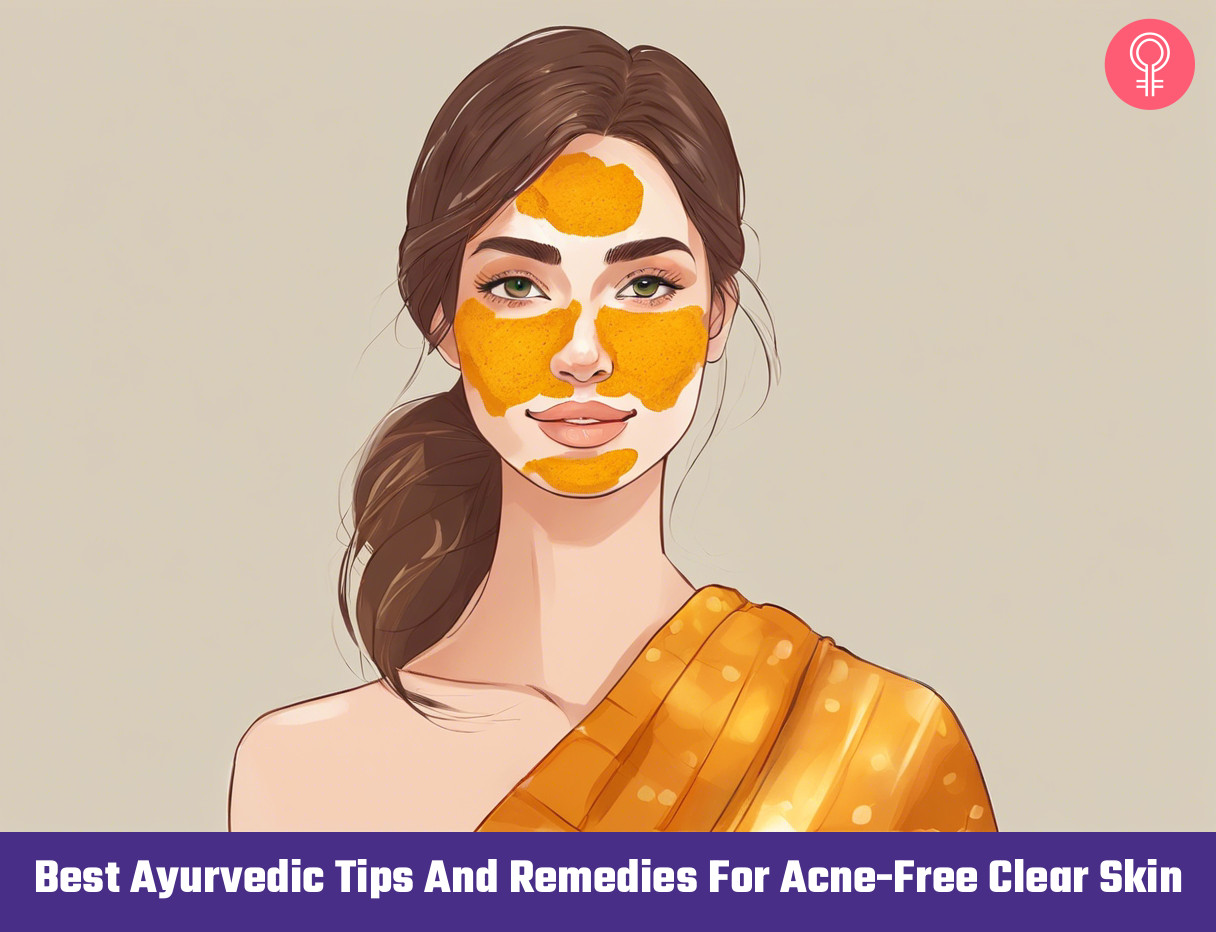
Image: Stable Diffusion/StyleCraze Design Team
Learn how to naturally reduce acne scars with Ayurvedic home remedies! Check out this video for simple tips to manage those pesky scars and get glowing skin.
Personal Experience: Source
StyleCraze's articles are interwoven with authentic personal narratives that provide depth and resonance to our content. Below are the sources of the personal accounts referenced in this article.
i. Simple DIY for curing pimpleshttps://msmeehnia.com/2016/07/25/simple-diy-for-curing-pimples/
References
Articles on StyleCraze are backed by verified information from peer-reviewed and academic research papers, reputed organizations, research institutions, and medical associations to ensure accuracy and relevance. Read our editorial policy to learn more.
- Effects of Turmeric (Curcuma longa) on Skin Health: A Systematic Review of the Clinical Evidence
https://pubmed.ncbi.nlm.nih.gov/27213821/ - Therapeutics Role of Azadirachta indica (Neem) and Their Active Constituents in Diseases Prevention and Treatment
https://www.ncbi.nlm.nih.gov/pmc/articles/PMC4791507/ - Azadirachta indica (Neem) as a Potential Natural Active for Dermocosmetic and Topical Products: A Narrative Review
https://www.mdpi.com/2079-9284/9/3/58 - ALOE VERA: A SHORT REVIEW
https://www.ncbi.nlm.nih.gov/pmc/articles/PMC2763764/ - Aloe vera Juice and Acne Vulgaris: A Placebo-Controlled Study
.https://scialert.net/abstract/?doi=ajcn.2014.29.34#:~:text=In%20conclusion%2C%20oral%20Aloe%20vera,significant%20when%20compared%20to%20controls - Effect of Aloe vera topical gel combined with tretinoin in treatment of mild and moderate acne vulgaris: a randomized, double-blind, prospective trial
https://pubmed.ncbi.nlm.nih.gov/23336746/ - Basil: A Brief Summary of Potential Health Benefits
https://www.researchgate.net/publication/324085682_Basil_A_Brief_Summary_of_Potential_Health_Benefits - Evaluation of in vitro antimicrobial activity of Thai basil oils and their micro-emulsion formulas against Propionibacterium acnes
https://pubmed.ncbi.nlm.nih.gov/18492147/ - Honey: its medicinal property and antibacterial activity
https://www.ncbi.nlm.nih.gov/pmc/articles/PMC3609166/ - Therapeutic Potential of Pterocarpus santalinus L.: An Update
https://www.ncbi.nlm.nih.gov/pmc/articles/PMC4791987/ - Sandalwood Album Oil as a Botanical Therapeutic in Dermatology
https://www.ncbi.nlm.nih.gov/pmc/articles/PMC5749697/ - Medicinal plants used in treatment of inflammatory skin diseases
https://www.ncbi.nlm.nih.gov/pmc/articles/PMC3834722/ - Therapeutic agents and herbs in topical application for acne treatment
https://onlinelibrary.wiley.com/doi/full/10.1111/j.1468-2494.2011.00647.x - Efficacy of a Novel Fenugreek Seed Extract (Trigonella foenum-graecum, FurocystTM) in Polycystic Ovary Syndrome (PCOS)
https://www.ncbi.nlm.nih.gov/pmc/articles/PMC4615243/ - Evaluation of Fenugreek (Trigonella foenum-graceum L.), Effects Seeds Extract on Insulin Resistance in Women with Polycystic Ovarian Syndrome
https://www.ncbi.nlm.nih.gov/pmc/articles/PMC3813238/ - Effect of a quality-controlled fermented nutraceutical on skin aging markers: An antioxidant-control, double-blind study
https://www.ncbi.nlm.nih.gov/pmc/articles/PMC4774357/ - Discovering the link between nutrition and skin aging
https://www.ncbi.nlm.nih.gov/pmc/articles/PMC3583891/ - Antioxidant activity of potato juice
https://pubmed.ncbi.nlm.nih.gov/22493159/ - Health Benefits and Cons of Solanum tuberosum
https://www.plantsjournal.com/vol1Issue1/Issue_jan_2013/3.pdf - Therapeutic Uses of Triphala in Ayurvedic Medicine
https://www.ncbi.nlm.nih.gov/pmc/articles/PMC5567597/ - Acne
https://www.niams.nih.gov/health-topics/acne - Comparative antimicrobial efficacy of ayurvedic formulations; Satva and Ghana of Tinospora cordifolia(Willd.) Miers (Giloy) against commensals and opportunistic pathogens
https://www.researchgate.net/publication/358618569_Comparative_antimicrobial_efficacy_of_ayurvedic_formulations_Satva_and_Ghana_of_Tinospora_cordifoliaWilld_Miers_Giloy_against_commensals_and_opportunistic_pathogens - An Overview On Ashwagandha
https://www.ncbi.nlm.nih.gov/pmc/articles/PMC3252722/ - Impact of stress on female reproductive health disorders: Possible beneficial effects of shatavari (Asparagus racemosus)
https://pubmed.ncbi.nlm.nih.gov/29635127/






